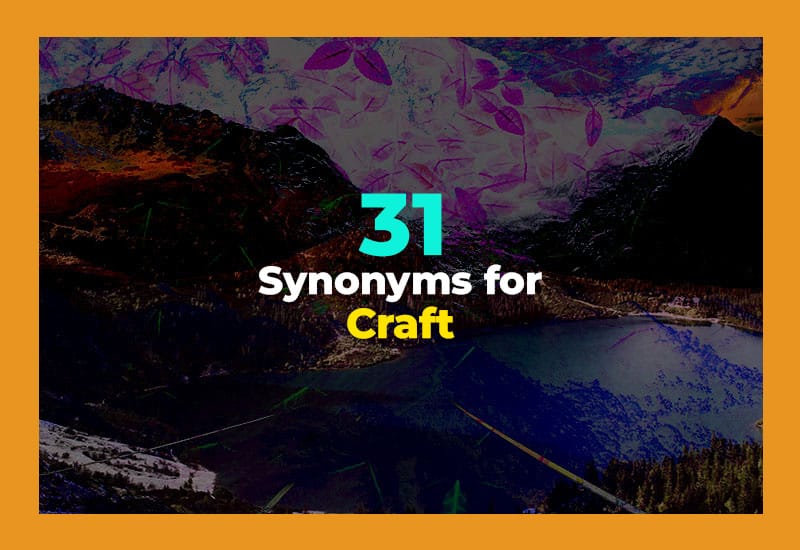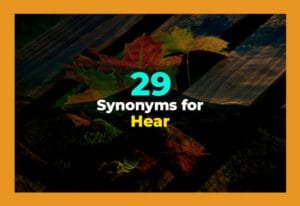You know that feeling when you make something with your own hands or show off a special skill? That's what craft is all about! It's more than just making stuff—it's about skill, creativity, and love. If you want to talk about craft but mix it up with other words, you're in the right place. Let's explore some cool and easy words that mean craft. I'll even give you simple examples so you can see how to use them.
1. Art
Art is when you create something beautiful or meaningful, usually with your hands or imagination. It's a way to express feelings or ideas. For example, painting a colorful picture or making a clay sculpture is art. People use art to show what they think or feel without words. When you make a handmade card or draw a picture for a friend, you are doing art. It's all about creativity and skill. Art can be simple or very detailed, but it always involves making something special from your heart.
2. Skill
Skill means being good at something because you have practiced a lot. When you learn to ride a bike or play the piano, that is skill. For example, a chef cooking a perfect meal has skill. Or think about a soccer player who kicks the ball just right. Skill helps you do tasks easily and well. It takes time to build skill, but once you have it, you can make or do amazing things. So, craft is also about skill—how well you can do what you love.
3. Trade
Trade is a type of job or work where you use special skills to make or fix things. For example, a carpenter building a wooden table or an electrician fixing wires are trades. These jobs usually need training and hands-on work. Trades are very important because they help build homes, cars, and many things we use every day. When someone says craft, they sometimes mean a trade because it's all about working with your hands and knowing how to do a job well.
4. Profession
A profession is a kind of work that usually needs special education or training. For example, a doctor helping patients or a teacher teaching kids have professions. When craft is part of a profession, it means the person is very good at their job because they learned a lot. People often work many years to become a professional in their craft. It shows respect and skill. So, craft can also mean the special work someone does as their career.
5. Vocation
Vocation means a strong feeling that a particular job or work is meant for you. It's like your calling in life. For example, someone who feels born to be a musician or a person who loves helping others as a nurse has a vocation. Craft fits here because it's about doing something you love and are good at, not just for money but because it makes you happy. When you find your craft as a vocation, work feels like fun, not a chore.
6. Occupation
Occupation is a simple word for the kind of work or job a person does. For example, a baker making bread or a gardener planting flowers has an occupation. It doesn't matter if the job is small or big; it's what you do daily. Craft relates to occupation when your job involves making or doing things with skill. Many occupations need craft, especially jobs where hands and creativity matter.
7. Workmanship
Workmanship means how well something is made or done. It's about the quality of the craft. For example, a handmade chair with smooth edges and strong joints shows great workmanship. When something is well-made, people can see the skill and care used to create it. Good workmanship makes products last longer and look nicer. So, when you hear craftsmanship, it usually means excellent workmanship in making things.
8. Technique
Technique is a special way or method of doing something. For example, a painter using brush strokes to create texture or a cook chopping vegetables perfectly uses technique. When you have a good technique, your craft looks better and works well. People learn techniques through practice and watching others. Craft includes many techniques because different skills need different ways of working. Knowing the right technique helps you do your craft easier and smarter.
9. Expertise
Expertise means having a lot of knowledge and skill in a particular craft. For example, a watchmaker who can fix tiny gears has expertise. Experts have practiced for a long time and know almost everything about their craft. When you want the best work done, you go to someone with expertise. Craft and expertise go hand in hand because you must be good at something to call it craft. The more expertise, the better the craft.
10. Ability
Ability means the power or skill to do something well. For example, a child learning to tie shoelaces is developing ability. When you can play a sport or solve puzzles, that is ability too. Craft needs ability because you must be able to do certain things to make or build something. Sometimes, ability is natural, and sometimes you get it by practice. Craft is all about having the ability to create or fix things nicely.
11. Talent
Talent is a natural gift for doing something well without much effort. For example, a kid who draws amazing pictures without lessons has talent. People say talent is special because not everyone has it. When you have talent in a craft, your work looks extra good or different. Talent is great, but you still need practice to get better. Craft combines talent and hard work to make something wonderful.
12. Dexterity
Dexterity means being good with your hands, especially for small or detailed work. For example, a jeweler making tiny rings shows great dexterity. Or a surgeon using tools carefully during an operation has dexterity. It's all about control and skill with your fingers and hands. Craft needs dexterity because many crafts involve fine, careful work. The better your dexterity, the nicer your craft will look.
13. Finesse
Finesse is skill and grace in doing something carefully and beautifully. For example, a dancer moving smoothly on stage or a chef plating food artistically shows finesse. It's not just about doing the job, but doing it well and with style. Craft with finesse means the work looks polished and special. When you put finesse into your craft, people notice the little details and quality.
14. Mastery
Mastery means being the best at a craft because you practiced a lot and learned deeply. For example, a master carpenter building perfect furniture shows mastery. Mastery takes years of work and learning. When you have mastery, you don't just know how to do the craft—you can teach others too. Craft and mastery go together because real craft means you control your skill fully.
15. Handiwork
Handiwork means something made by hand with care. For example, a knitted scarf made by your grandma is handiwork. It shows love and effort in making. Handiwork feels special because it's not made by machines but by people. Craft is often handiwork because it's about creating things with your hands. When you give someone your handiwork, it means you made something just for them.
16. Creation
Creation means making something new from your ideas and hands. For example, a writer creating a story or a potter making a new vase is creation. It's about bringing something into the world that wasn't there before. Craft involves creation because it's about using skills to make objects or art. Every time you build or design, you are part of creation, showing your unique touch.
17. Construction
Construction is building something strong and useful, like houses, bridges, or furniture. For example, workers building a new home are in construction. Craft plays a big role because building needs skill and care. When you put bricks carefully or nail wood perfectly, that's craft in construction. It needs planning, strength, and skill to make things that last.
18. Fabrication
Fabrication means making something by putting parts together. For example, assembling a metal bike frame or making a machine is fabrication. It involves skill and knowledge to join parts well. Craft and fabrication go together because many crafts involve creating parts and combining them. If you've ever built a model kit or fixed a gadget, you've done fabrication.
19. Manufacture
Manufacture means making products, often in large amounts, using tools and machines. For example, factories manufacturing toys create many copies. Craft in manufacture can mean making things carefully and well, even if machines help. Some craftspeople manufacture small batches of handmade goods, like handmade soaps or candles. Manufacture is about producing things from raw materials using skill and tools.
20. Design
Design is planning and creating the look or function of something before making it. For example, a fashion designer planning clothes or an architect drawing a building is design. Craft includes design because good making starts with a great plan. When you design something, you think about how it looks and works. Design is the first step in many crafts.
21. Production
Production means the process of making something, from start to finish. For example, a bakery's production of fresh bread every day is production. Craft is involved in production when people put skill and care into every step. Whether you make one special item or many, production is how things are created. Craft makes production better by adding skill and attention.
22. Artisanry
Artisanry is the work of an artisan, someone who makes things by hand with skill. For example, a potter creating beautiful bowls or a blacksmith making tools shows artisanry. It's about traditional skills and careful work. Artisanry is a fancy word for craft done with care and love by skilled hands.
23. Handcraft
Handcraft means making things by hand, not by machines. For example, handwoven baskets or hand-sewn clothes are handcrafts. It's a special kind of craft that shows patience and skill. When you buy a handcraft item, you get something unique and made with care. Handcraft keeps old skills alive and makes special gifts.
24. Craftsmanship
Craftsmanship is the quality and skill shown in making something. For example, a handmade watch with perfect details shows craftsmanship. It means the maker knows their craft well and cares about the result. Craftsmanship is often the reason why handmade items are special and valuable.
25. Making
Making is simply the act of creating or building something. For example, making a birthday card or making a birdhouse shows making. It's the basic part of craft—when you start with materials and end with a finished product. Making is fun and rewarding because you see your work come alive.
26. Building
Building is putting pieces together to make something strong and useful. For example, building a treehouse with friends or building a sandcastle is building. Craft is part of building because it takes skill and care to make something that lasts and looks good. Building can be big or small, but it's always creative.
27. Assembly
Assembly means putting parts together in the right order. For example, assembling a toy kit or putting together a chair involves assembly. Craft helps assembly by making sure everything fits well and looks good. When you follow steps carefully, your craft turns into a perfect finished product.
28. Composition
Composition means arranging parts or elements to create a whole. For example, a photographer composing a perfect shot or a musician writing a song shows composition. Craft includes composition because good work depends on how well everything fits together. It's about balance and harmony in making.
29. Formation
Formation means creating a shape or structure. For example, formation of pottery on a wheel or formation of patterns in weaving shows formation. Craft depends on formation because making things often means shaping and structuring materials carefully. Good formation makes the craft strong and beautiful.
30. Sculpting
Sculpting is making art by shaping materials like clay, stone, or wood. For example, sculpting a statue from marble or shaping clay pots is sculpting. It's a special craft that takes skill and patience. Sculpting turns raw materials into amazing art that people can touch and see.

I hope you enjoyed learning these different ways to say craft! Each word shows a little different side of making, creating, or working with skill. Remember, craft is all about passion and practice, no matter which word you use. Keep making and enjoying your own special craft!









